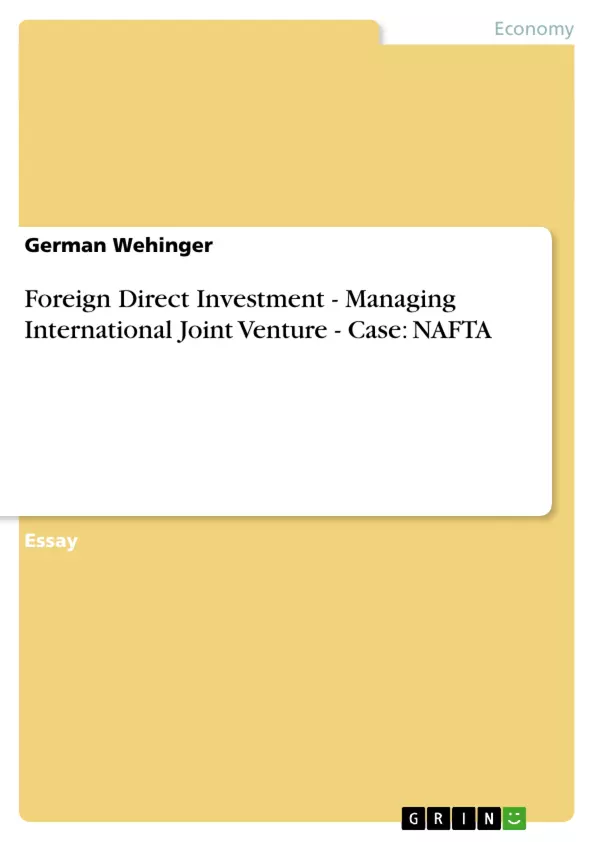The importance of international trade to a nation’s economic welfare and development has been heavily documented in the economics literature since Adam Smiths pioneering inquiry into the nature and causes of the wealth of nations. There are several theories under rubric of foreign direct investment (FDI), including the internalization theory. Internalization theory centres on the nation that firms aspire to develop their own internal markets whenever transactions can be made at lower cost within the firm. Internalization theories endeavour to explain how and why the firm engages in overseas activities and in particular how the dynamic nature of such behaviour can be conceptualized (Morgan et al., 1997).
Inhaltsverzeichnis (Table of Contents)
- Introduction
- Objective of analysis
- Analytical proceeding
- Foreign Direct Investments (FDI)
- International Joint Venture
- General overview
- Types of Joint Venture
- Joint Venture System
- Trust in international joint ventures (IJV)
- Explaining trust
- The role of trust in IJVs: a transaction cost approach
- A process model of trust
- Managing the international joint venture
- Formation process
- Boundary relationship
- Operational management
- Creating value in a IJV network
- Transfer
- Transformation
- Harvesting
- Case Study
- The IJV Elsa
- The customers
- The managers
- The structure of Elsa
- Summary
- The IJV Kenam
- The design of the foundry
- The partners
- Summary
- Interpretation
- References
Zielsetzung und Themenschwerpunkte (Objectives and Key Themes)
This paper analyzes the role of foreign direct investment, specifically through the lens of international joint ventures, within the context of the North American Free Trade Agreement (NAFTA). It focuses on two case studies, Elsa and Kenam, to illustrate the complexities of managing international joint ventures and the factors that contribute to their success or failure. The paper explores the importance of trust in these ventures and outlines a process model for managing the international joint venture.
- The importance of foreign direct investment (FDI) in global economic development.
- The role of trust in building and sustaining successful international joint ventures (IJVs).
- The challenges and opportunities associated with managing international joint ventures.
- The critical factors that influence the success or failure of IJVs.
- The application of theoretical concepts to real-world cases of IJVs within NAFTA.
Zusammenfassung der Kapitel (Chapter Summaries)
The introductory chapter sets the context for the study, emphasizing the significance of international trade and foreign direct investment (FDI) in a nation's economic welfare. It introduces the internalization theory, which explains why companies engage in overseas activities. The chapter then outlines the objective of analyzing two international joint ventures, Elsa and Kenam, both located within NAFTA.
Chapter II delves into the concept of foreign direct investments (FDI), showcasing its increasing significance globally over the past 30 years. It highlights various forms of FDI, including acquisition, Greenfield investment, and joint ventures, and emphasizes the advantages of foreign production facilities for companies.
Chapter III explores the realm of international joint ventures (IJVs), providing a general overview of their types and systems. It delves into the crucial role of trust in IJVs, exploring its explanation, its relevance from a transaction cost perspective, and a process model for developing trust.
Chapter IV provides a comprehensive analysis of managing international joint ventures, covering the formation process, boundary relationships, operational management, and the creation of value through transfer, transformation, and harvesting.
The Case Study section, presented in Chapter V, investigates two specific IJVs: Elsa and Kenam. Each case study analyzes the customers, managers, structure, and summarizes the key aspects of each venture.
Schlüsselwörter (Keywords)
This study focuses on key concepts such as foreign direct investment, international joint ventures, trust, management, NAFTA, and case study analysis. The primary themes explored include the complexities of managing international partnerships, the importance of trust in facilitating successful ventures, and the factors that influence the performance and outcomes of international joint ventures.
- Quote paper
- German Wehinger (Author), 2003, Foreign Direct Investment - Managing International Joint Venture - Case: NAFTA, Munich, GRIN Verlag, https://www.grin.com/document/43397



